Global Financial crisis 2008 PDF
VerifiedAdded on 2021/01/02
|7
|1920
|130
AI Summary
Contribute Materials
Your contribution can guide someone’s learning journey. Share your
documents today.
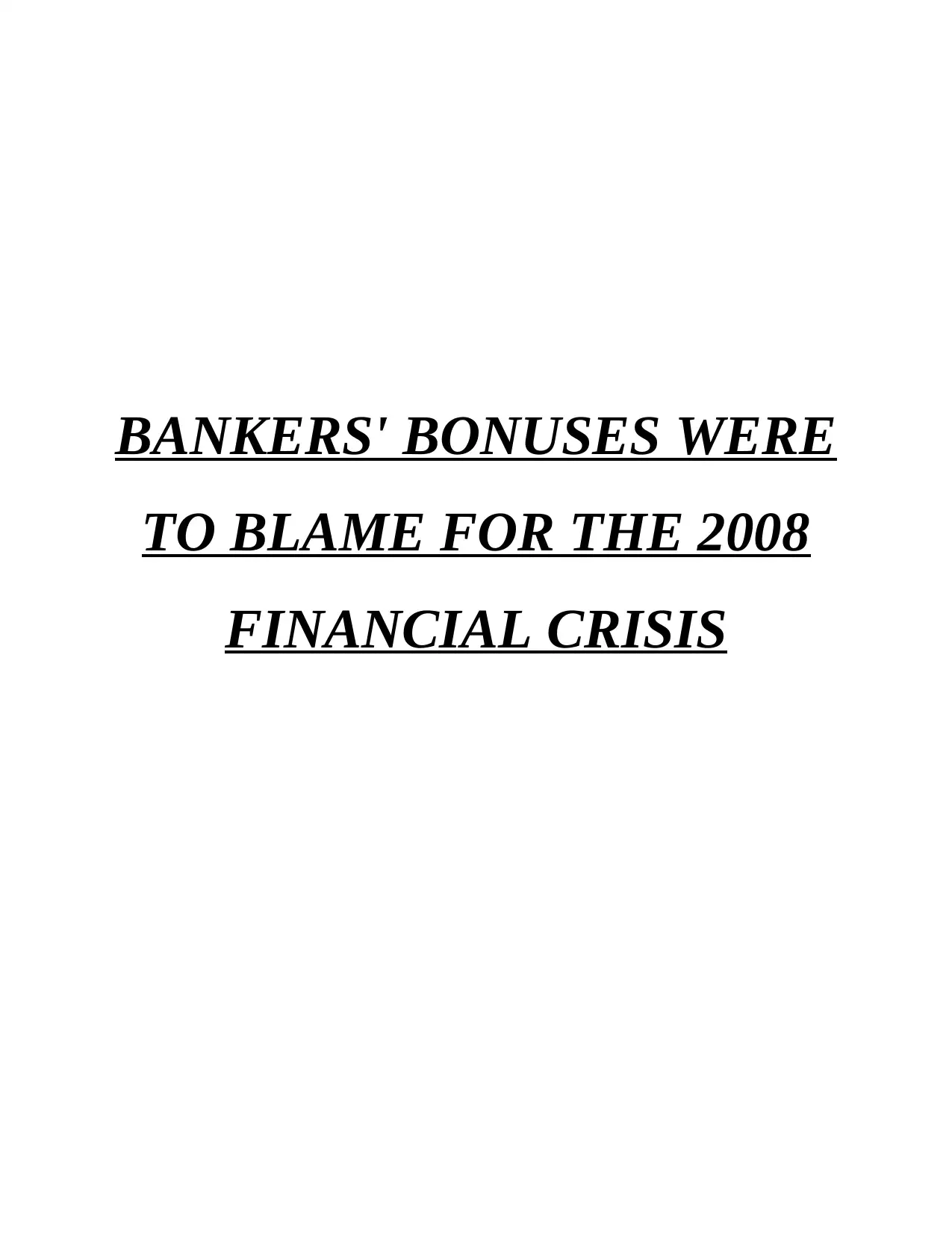
BANKERS' BONUSES WERE
TO BLAME FOR THE 2008
FINANCIAL CRISIS
TO BLAME FOR THE 2008
FINANCIAL CRISIS
Secure Best Marks with AI Grader
Need help grading? Try our AI Grader for instant feedback on your assignments.

Table of Contents
INTRODUCTION...........................................................................................................................1
MAIN BODY ..................................................................................................................................1
CONCLUSION................................................................................................................................4
INTRODUCTION...........................................................................................................................1
MAIN BODY ..................................................................................................................................1
CONCLUSION................................................................................................................................4
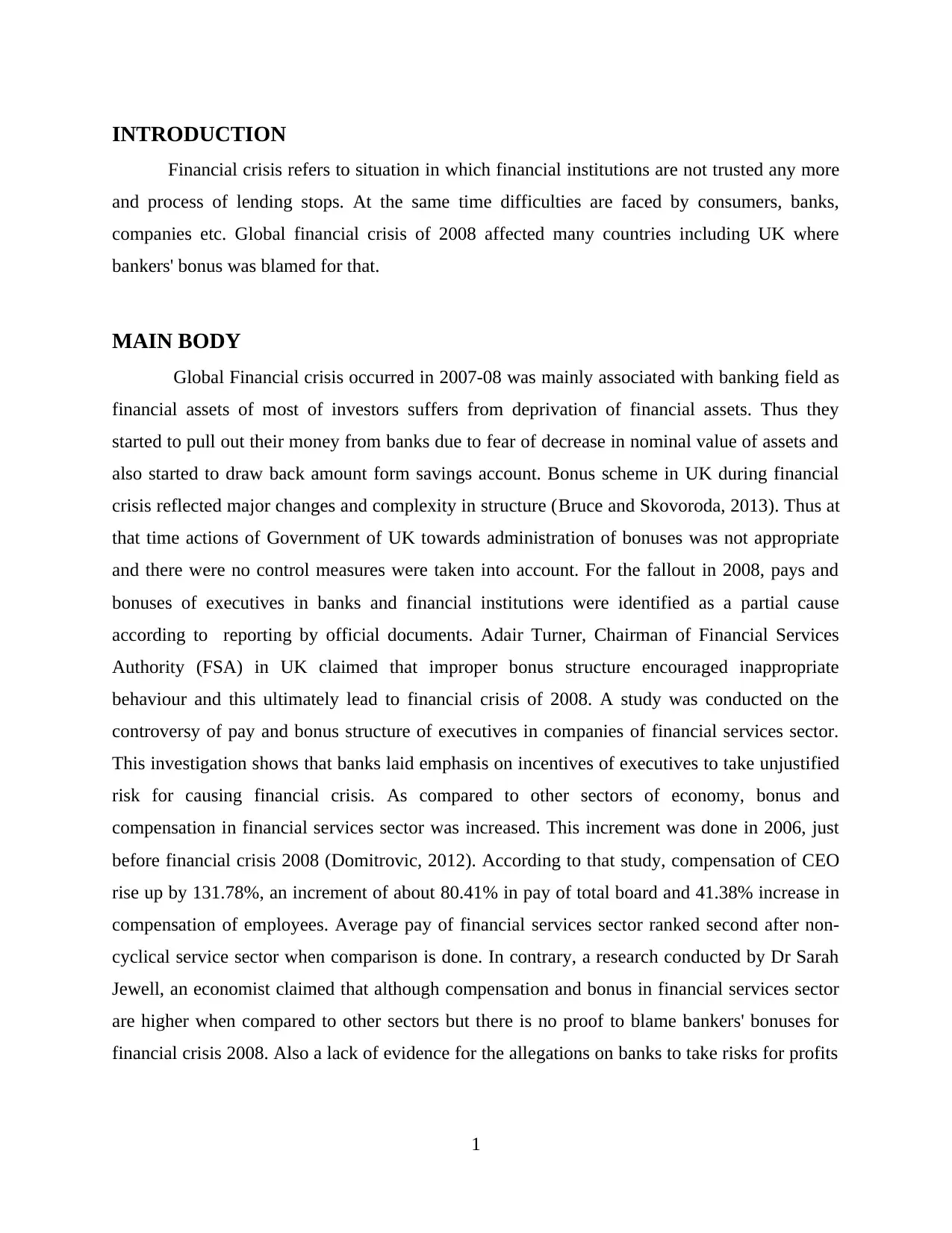
INTRODUCTION
Financial crisis refers to situation in which financial institutions are not trusted any more
and process of lending stops. At the same time difficulties are faced by consumers, banks,
companies etc. Global financial crisis of 2008 affected many countries including UK where
bankers' bonus was blamed for that.
MAIN BODY
Global Financial crisis occurred in 2007-08 was mainly associated with banking field as
financial assets of most of investors suffers from deprivation of financial assets. Thus they
started to pull out their money from banks due to fear of decrease in nominal value of assets and
also started to draw back amount form savings account. Bonus scheme in UK during financial
crisis reflected major changes and complexity in structure (Bruce and Skovoroda, 2013). Thus at
that time actions of Government of UK towards administration of bonuses was not appropriate
and there were no control measures were taken into account. For the fallout in 2008, pays and
bonuses of executives in banks and financial institutions were identified as a partial cause
according to reporting by official documents. Adair Turner, Chairman of Financial Services
Authority (FSA) in UK claimed that improper bonus structure encouraged inappropriate
behaviour and this ultimately lead to financial crisis of 2008. A study was conducted on the
controversy of pay and bonus structure of executives in companies of financial services sector.
This investigation shows that banks laid emphasis on incentives of executives to take unjustified
risk for causing financial crisis. As compared to other sectors of economy, bonus and
compensation in financial services sector was increased. This increment was done in 2006, just
before financial crisis 2008 (Domitrovic, 2012). According to that study, compensation of CEO
rise up by 131.78%, an increment of about 80.41% in pay of total board and 41.38% increase in
compensation of employees. Average pay of financial services sector ranked second after non-
cyclical service sector when comparison is done. In contrary, a research conducted by Dr Sarah
Jewell, an economist claimed that although compensation and bonus in financial services sector
are higher when compared to other sectors but there is no proof to blame bankers' bonuses for
financial crisis 2008. Also a lack of evidence for the allegations on banks to take risks for profits
1
Financial crisis refers to situation in which financial institutions are not trusted any more
and process of lending stops. At the same time difficulties are faced by consumers, banks,
companies etc. Global financial crisis of 2008 affected many countries including UK where
bankers' bonus was blamed for that.
MAIN BODY
Global Financial crisis occurred in 2007-08 was mainly associated with banking field as
financial assets of most of investors suffers from deprivation of financial assets. Thus they
started to pull out their money from banks due to fear of decrease in nominal value of assets and
also started to draw back amount form savings account. Bonus scheme in UK during financial
crisis reflected major changes and complexity in structure (Bruce and Skovoroda, 2013). Thus at
that time actions of Government of UK towards administration of bonuses was not appropriate
and there were no control measures were taken into account. For the fallout in 2008, pays and
bonuses of executives in banks and financial institutions were identified as a partial cause
according to reporting by official documents. Adair Turner, Chairman of Financial Services
Authority (FSA) in UK claimed that improper bonus structure encouraged inappropriate
behaviour and this ultimately lead to financial crisis of 2008. A study was conducted on the
controversy of pay and bonus structure of executives in companies of financial services sector.
This investigation shows that banks laid emphasis on incentives of executives to take unjustified
risk for causing financial crisis. As compared to other sectors of economy, bonus and
compensation in financial services sector was increased. This increment was done in 2006, just
before financial crisis 2008 (Domitrovic, 2012). According to that study, compensation of CEO
rise up by 131.78%, an increment of about 80.41% in pay of total board and 41.38% increase in
compensation of employees. Average pay of financial services sector ranked second after non-
cyclical service sector when comparison is done. In contrary, a research conducted by Dr Sarah
Jewell, an economist claimed that although compensation and bonus in financial services sector
are higher when compared to other sectors but there is no proof to blame bankers' bonuses for
financial crisis 2008. Also a lack of evidence for the allegations on banks to take risks for profits
1
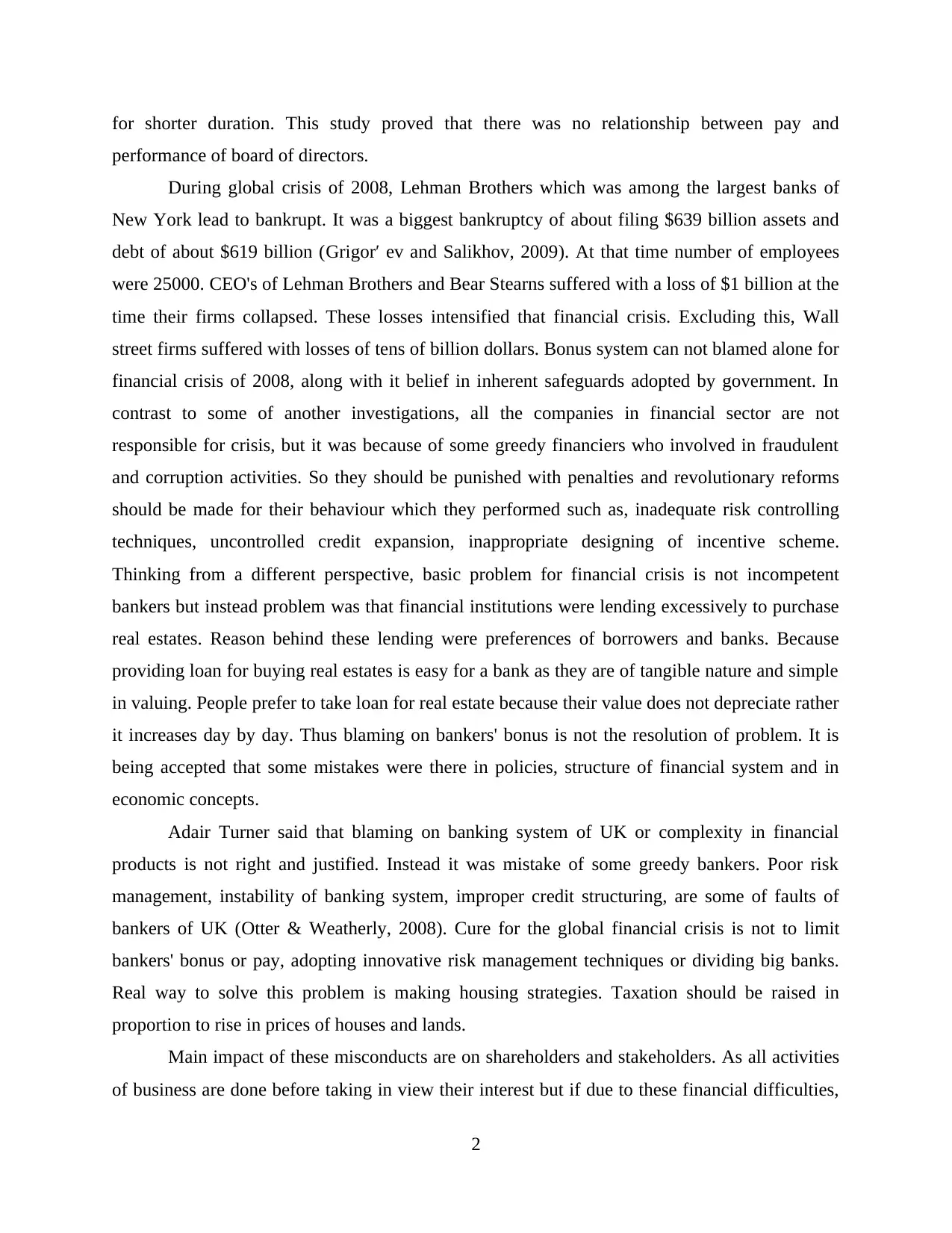
for shorter duration. This study proved that there was no relationship between pay and
performance of board of directors.
During global crisis of 2008, Lehman Brothers which was among the largest banks of
New York lead to bankrupt. It was a biggest bankruptcy of about filing $639 billion assets and
debt of about $619 billion (Grigor′ ev and Salikhov, 2009). At that time number of employees
were 25000. CEO's of Lehman Brothers and Bear Stearns suffered with a loss of $1 billion at the
time their firms collapsed. These losses intensified that financial crisis. Excluding this, Wall
street firms suffered with losses of tens of billion dollars. Bonus system can not blamed alone for
financial crisis of 2008, along with it belief in inherent safeguards adopted by government. In
contrast to some of another investigations, all the companies in financial sector are not
responsible for crisis, but it was because of some greedy financiers who involved in fraudulent
and corruption activities. So they should be punished with penalties and revolutionary reforms
should be made for their behaviour which they performed such as, inadequate risk controlling
techniques, uncontrolled credit expansion, inappropriate designing of incentive scheme.
Thinking from a different perspective, basic problem for financial crisis is not incompetent
bankers but instead problem was that financial institutions were lending excessively to purchase
real estates. Reason behind these lending were preferences of borrowers and banks. Because
providing loan for buying real estates is easy for a bank as they are of tangible nature and simple
in valuing. People prefer to take loan for real estate because their value does not depreciate rather
it increases day by day. Thus blaming on bankers' bonus is not the resolution of problem. It is
being accepted that some mistakes were there in policies, structure of financial system and in
economic concepts.
Adair Turner said that blaming on banking system of UK or complexity in financial
products is not right and justified. Instead it was mistake of some greedy bankers. Poor risk
management, instability of banking system, improper credit structuring, are some of faults of
bankers of UK (Otter & Weatherly, 2008). Cure for the global financial crisis is not to limit
bankers' bonus or pay, adopting innovative risk management techniques or dividing big banks.
Real way to solve this problem is making housing strategies. Taxation should be raised in
proportion to rise in prices of houses and lands.
Main impact of these misconducts are on shareholders and stakeholders. As all activities
of business are done before taking in view their interest but if due to these financial difficulties,
2
performance of board of directors.
During global crisis of 2008, Lehman Brothers which was among the largest banks of
New York lead to bankrupt. It was a biggest bankruptcy of about filing $639 billion assets and
debt of about $619 billion (Grigor′ ev and Salikhov, 2009). At that time number of employees
were 25000. CEO's of Lehman Brothers and Bear Stearns suffered with a loss of $1 billion at the
time their firms collapsed. These losses intensified that financial crisis. Excluding this, Wall
street firms suffered with losses of tens of billion dollars. Bonus system can not blamed alone for
financial crisis of 2008, along with it belief in inherent safeguards adopted by government. In
contrast to some of another investigations, all the companies in financial sector are not
responsible for crisis, but it was because of some greedy financiers who involved in fraudulent
and corruption activities. So they should be punished with penalties and revolutionary reforms
should be made for their behaviour which they performed such as, inadequate risk controlling
techniques, uncontrolled credit expansion, inappropriate designing of incentive scheme.
Thinking from a different perspective, basic problem for financial crisis is not incompetent
bankers but instead problem was that financial institutions were lending excessively to purchase
real estates. Reason behind these lending were preferences of borrowers and banks. Because
providing loan for buying real estates is easy for a bank as they are of tangible nature and simple
in valuing. People prefer to take loan for real estate because their value does not depreciate rather
it increases day by day. Thus blaming on bankers' bonus is not the resolution of problem. It is
being accepted that some mistakes were there in policies, structure of financial system and in
economic concepts.
Adair Turner said that blaming on banking system of UK or complexity in financial
products is not right and justified. Instead it was mistake of some greedy bankers. Poor risk
management, instability of banking system, improper credit structuring, are some of faults of
bankers of UK (Otter & Weatherly, 2008). Cure for the global financial crisis is not to limit
bankers' bonus or pay, adopting innovative risk management techniques or dividing big banks.
Real way to solve this problem is making housing strategies. Taxation should be raised in
proportion to rise in prices of houses and lands.
Main impact of these misconducts are on shareholders and stakeholders. As all activities
of business are done before taking in view their interest but if due to these financial difficulties,
2
Secure Best Marks with AI Grader
Need help grading? Try our AI Grader for instant feedback on your assignments.
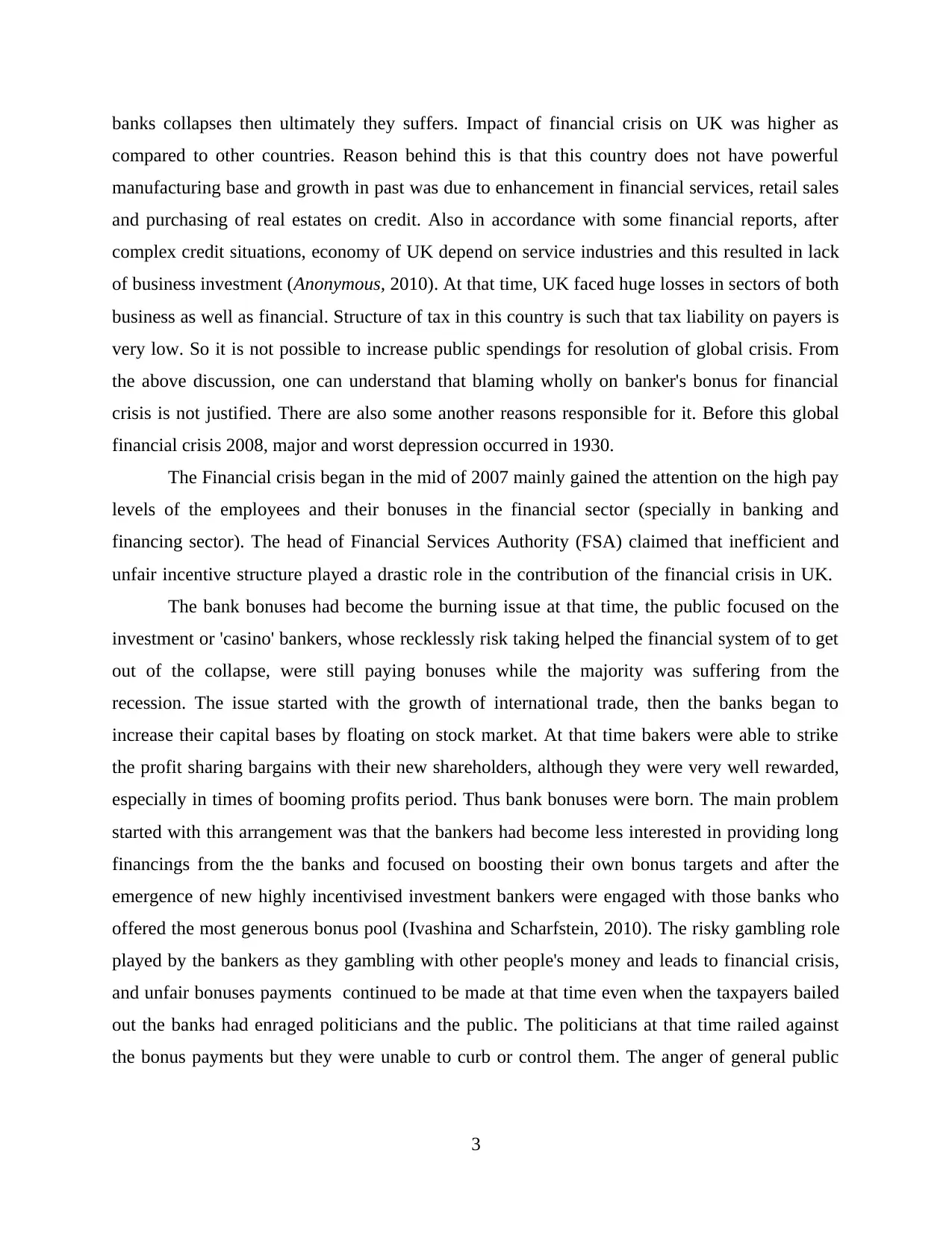
banks collapses then ultimately they suffers. Impact of financial crisis on UK was higher as
compared to other countries. Reason behind this is that this country does not have powerful
manufacturing base and growth in past was due to enhancement in financial services, retail sales
and purchasing of real estates on credit. Also in accordance with some financial reports, after
complex credit situations, economy of UK depend on service industries and this resulted in lack
of business investment (Anonymous, 2010). At that time, UK faced huge losses in sectors of both
business as well as financial. Structure of tax in this country is such that tax liability on payers is
very low. So it is not possible to increase public spendings for resolution of global crisis. From
the above discussion, one can understand that blaming wholly on banker's bonus for financial
crisis is not justified. There are also some another reasons responsible for it. Before this global
financial crisis 2008, major and worst depression occurred in 1930.
The Financial crisis began in the mid of 2007 mainly gained the attention on the high pay
levels of the employees and their bonuses in the financial sector (specially in banking and
financing sector). The head of Financial Services Authority (FSA) claimed that inefficient and
unfair incentive structure played a drastic role in the contribution of the financial crisis in UK.
The bank bonuses had become the burning issue at that time, the public focused on the
investment or 'casino' bankers, whose recklessly risk taking helped the financial system of to get
out of the collapse, were still paying bonuses while the majority was suffering from the
recession. The issue started with the growth of international trade, then the banks began to
increase their capital bases by floating on stock market. At that time bakers were able to strike
the profit sharing bargains with their new shareholders, although they were very well rewarded,
especially in times of booming profits period. Thus bank bonuses were born. The main problem
started with this arrangement was that the bankers had become less interested in providing long
financings from the the banks and focused on boosting their own bonus targets and after the
emergence of new highly incentivised investment bankers were engaged with those banks who
offered the most generous bonus pool (Ivashina and Scharfstein, 2010). The risky gambling role
played by the bankers as they gambling with other people's money and leads to financial crisis,
and unfair bonuses payments continued to be made at that time even when the taxpayers bailed
out the banks had enraged politicians and the public. The politicians at that time railed against
the bonus payments but they were unable to curb or control them. The anger of general public
3
compared to other countries. Reason behind this is that this country does not have powerful
manufacturing base and growth in past was due to enhancement in financial services, retail sales
and purchasing of real estates on credit. Also in accordance with some financial reports, after
complex credit situations, economy of UK depend on service industries and this resulted in lack
of business investment (Anonymous, 2010). At that time, UK faced huge losses in sectors of both
business as well as financial. Structure of tax in this country is such that tax liability on payers is
very low. So it is not possible to increase public spendings for resolution of global crisis. From
the above discussion, one can understand that blaming wholly on banker's bonus for financial
crisis is not justified. There are also some another reasons responsible for it. Before this global
financial crisis 2008, major and worst depression occurred in 1930.
The Financial crisis began in the mid of 2007 mainly gained the attention on the high pay
levels of the employees and their bonuses in the financial sector (specially in banking and
financing sector). The head of Financial Services Authority (FSA) claimed that inefficient and
unfair incentive structure played a drastic role in the contribution of the financial crisis in UK.
The bank bonuses had become the burning issue at that time, the public focused on the
investment or 'casino' bankers, whose recklessly risk taking helped the financial system of to get
out of the collapse, were still paying bonuses while the majority was suffering from the
recession. The issue started with the growth of international trade, then the banks began to
increase their capital bases by floating on stock market. At that time bakers were able to strike
the profit sharing bargains with their new shareholders, although they were very well rewarded,
especially in times of booming profits period. Thus bank bonuses were born. The main problem
started with this arrangement was that the bankers had become less interested in providing long
financings from the the banks and focused on boosting their own bonus targets and after the
emergence of new highly incentivised investment bankers were engaged with those banks who
offered the most generous bonus pool (Ivashina and Scharfstein, 2010). The risky gambling role
played by the bankers as they gambling with other people's money and leads to financial crisis,
and unfair bonuses payments continued to be made at that time even when the taxpayers bailed
out the banks had enraged politicians and the public. The politicians at that time railed against
the bonus payments but they were unable to curb or control them. The anger of general public
3
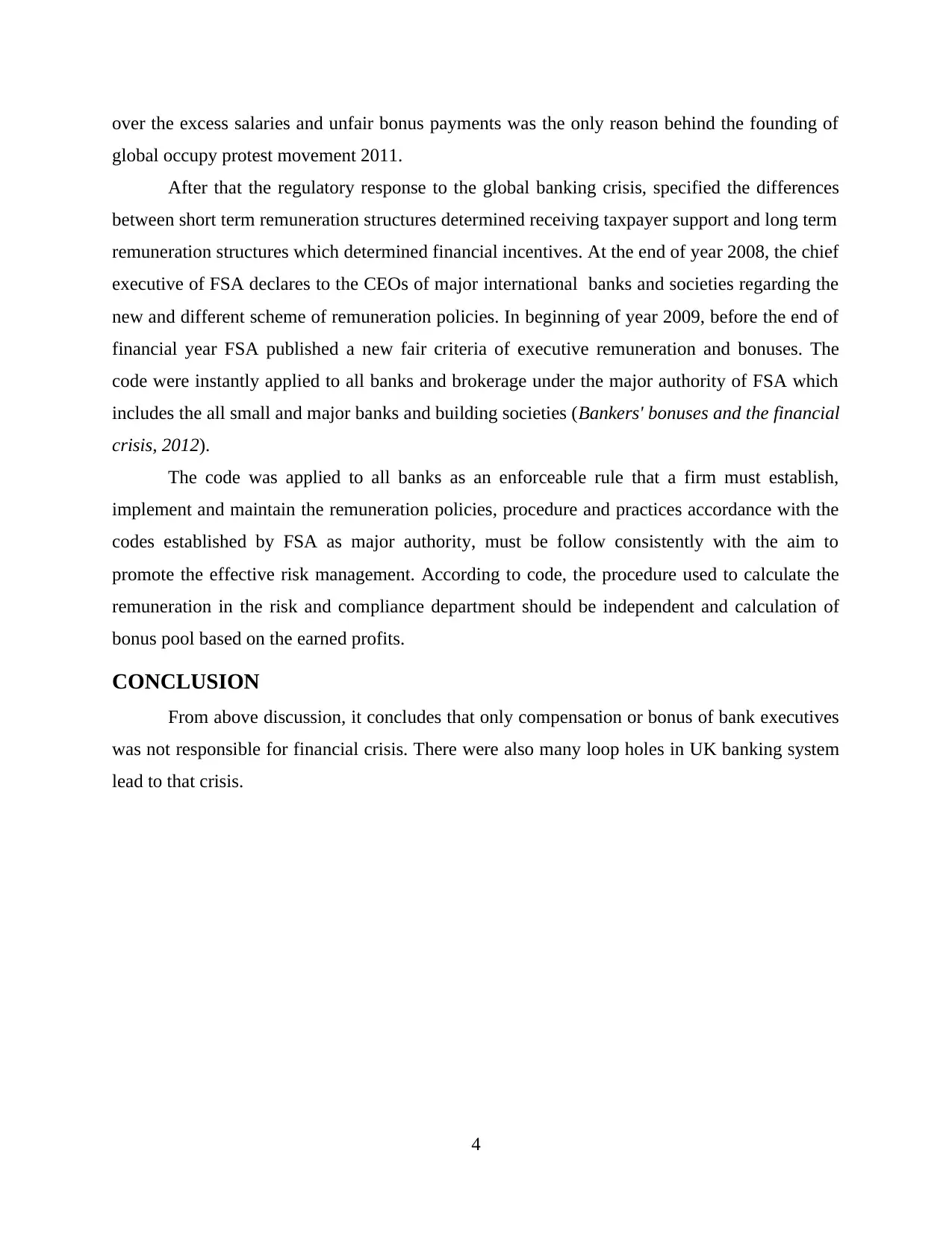
over the excess salaries and unfair bonus payments was the only reason behind the founding of
global occupy protest movement 2011.
After that the regulatory response to the global banking crisis, specified the differences
between short term remuneration structures determined receiving taxpayer support and long term
remuneration structures which determined financial incentives. At the end of year 2008, the chief
executive of FSA declares to the CEOs of major international banks and societies regarding the
new and different scheme of remuneration policies. In beginning of year 2009, before the end of
financial year FSA published a new fair criteria of executive remuneration and bonuses. The
code were instantly applied to all banks and brokerage under the major authority of FSA which
includes the all small and major banks and building societies (Bankers' bonuses and the financial
crisis, 2012).
The code was applied to all banks as an enforceable rule that a firm must establish,
implement and maintain the remuneration policies, procedure and practices accordance with the
codes established by FSA as major authority, must be follow consistently with the aim to
promote the effective risk management. According to code, the procedure used to calculate the
remuneration in the risk and compliance department should be independent and calculation of
bonus pool based on the earned profits.
CONCLUSION
From above discussion, it concludes that only compensation or bonus of bank executives
was not responsible for financial crisis. There were also many loop holes in UK banking system
lead to that crisis.
4
global occupy protest movement 2011.
After that the regulatory response to the global banking crisis, specified the differences
between short term remuneration structures determined receiving taxpayer support and long term
remuneration structures which determined financial incentives. At the end of year 2008, the chief
executive of FSA declares to the CEOs of major international banks and societies regarding the
new and different scheme of remuneration policies. In beginning of year 2009, before the end of
financial year FSA published a new fair criteria of executive remuneration and bonuses. The
code were instantly applied to all banks and brokerage under the major authority of FSA which
includes the all small and major banks and building societies (Bankers' bonuses and the financial
crisis, 2012).
The code was applied to all banks as an enforceable rule that a firm must establish,
implement and maintain the remuneration policies, procedure and practices accordance with the
codes established by FSA as major authority, must be follow consistently with the aim to
promote the effective risk management. According to code, the procedure used to calculate the
remuneration in the risk and compliance department should be independent and calculation of
bonus pool based on the earned profits.
CONCLUSION
From above discussion, it concludes that only compensation or bonus of bank executives
was not responsible for financial crisis. There were also many loop holes in UK banking system
lead to that crisis.
4
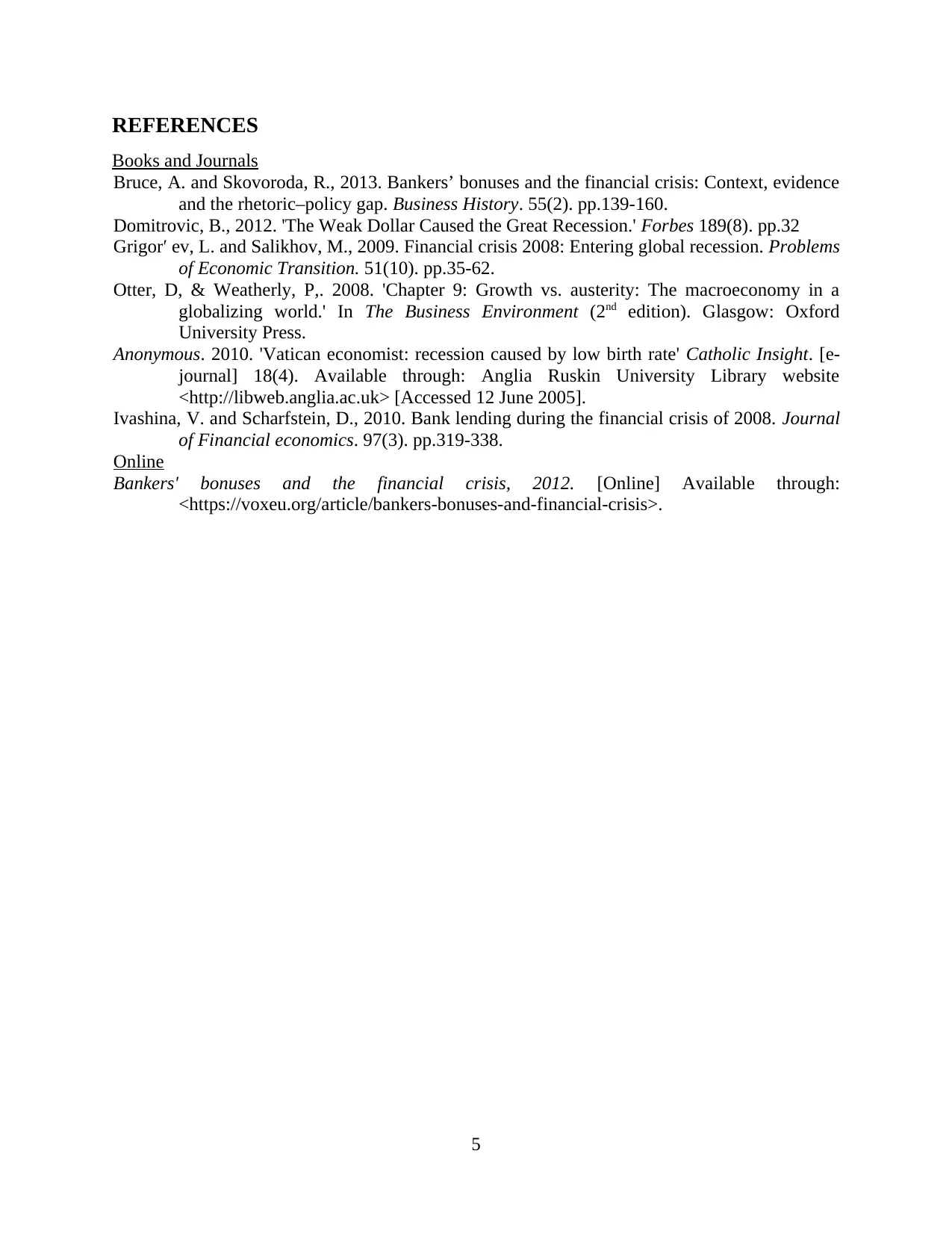
REFERENCES
Books and Journals
Bruce, A. and Skovoroda, R., 2013. Bankers’ bonuses and the financial crisis: Context, evidence
and the rhetoric–policy gap. Business History. 55(2). pp.139-160.
Domitrovic, B., 2012. 'The Weak Dollar Caused the Great Recession.' Forbes 189(8). pp.32
Grigor′ ev, L. and Salikhov, M., 2009. Financial crisis 2008: Entering global recession. Problems
of Economic Transition. 51(10). pp.35-62.
Otter, D, & Weatherly, P,. 2008. 'Chapter 9: Growth vs. austerity: The macroeconomy in a
globalizing world.' In The Business Environment (2nd edition). Glasgow: Oxford
University Press.
Anonymous. 2010. 'Vatican economist: recession caused by low birth rate' Catholic Insight. [e-
journal] 18(4). Available through: Anglia Ruskin University Library website
<http://libweb.anglia.ac.uk> [Accessed 12 June 2005].
Ivashina, V. and Scharfstein, D., 2010. Bank lending during the financial crisis of 2008. Journal
of Financial economics. 97(3). pp.319-338.
Online
Bankers' bonuses and the financial crisis, 2012. [Online] Available through:
<https://voxeu.org/article/bankers-bonuses-and-financial-crisis>.
5
Books and Journals
Bruce, A. and Skovoroda, R., 2013. Bankers’ bonuses and the financial crisis: Context, evidence
and the rhetoric–policy gap. Business History. 55(2). pp.139-160.
Domitrovic, B., 2012. 'The Weak Dollar Caused the Great Recession.' Forbes 189(8). pp.32
Grigor′ ev, L. and Salikhov, M., 2009. Financial crisis 2008: Entering global recession. Problems
of Economic Transition. 51(10). pp.35-62.
Otter, D, & Weatherly, P,. 2008. 'Chapter 9: Growth vs. austerity: The macroeconomy in a
globalizing world.' In The Business Environment (2nd edition). Glasgow: Oxford
University Press.
Anonymous. 2010. 'Vatican economist: recession caused by low birth rate' Catholic Insight. [e-
journal] 18(4). Available through: Anglia Ruskin University Library website
<http://libweb.anglia.ac.uk> [Accessed 12 June 2005].
Ivashina, V. and Scharfstein, D., 2010. Bank lending during the financial crisis of 2008. Journal
of Financial economics. 97(3). pp.319-338.
Online
Bankers' bonuses and the financial crisis, 2012. [Online] Available through:
<https://voxeu.org/article/bankers-bonuses-and-financial-crisis>.
5
1 out of 7
Related Documents
Your All-in-One AI-Powered Toolkit for Academic Success.
+13062052269
info@desklib.com
Available 24*7 on WhatsApp / Email
![[object Object]](/_next/static/media/star-bottom.7253800d.svg)
Unlock your academic potential
© 2024 | Zucol Services PVT LTD | All rights reserved.





